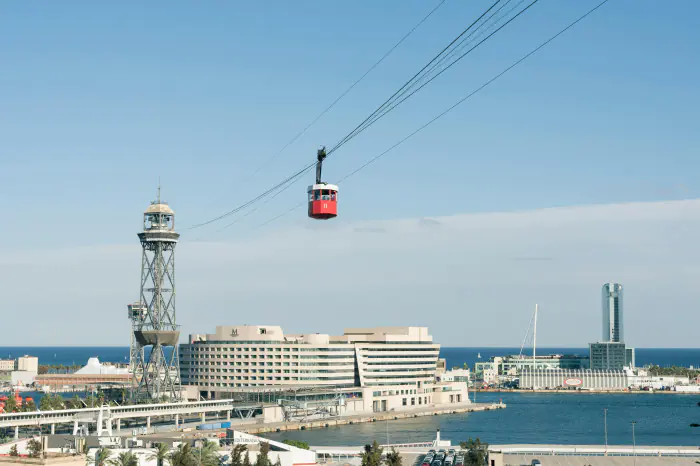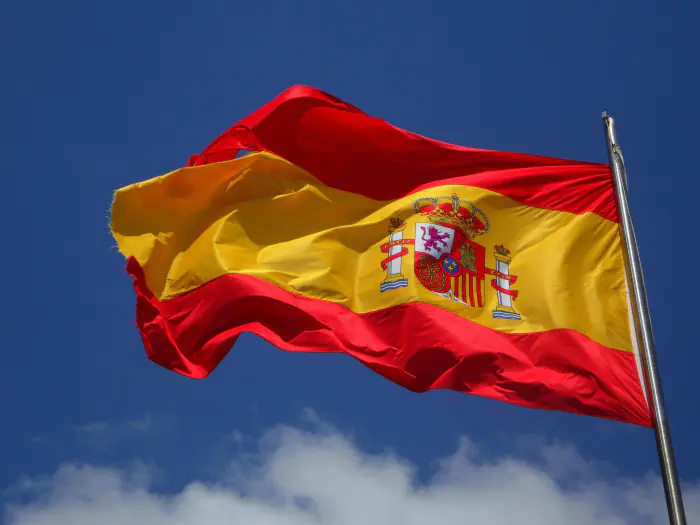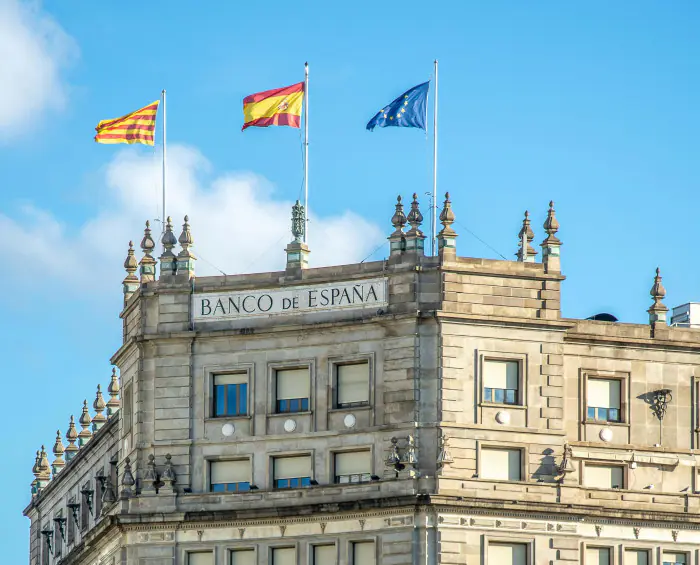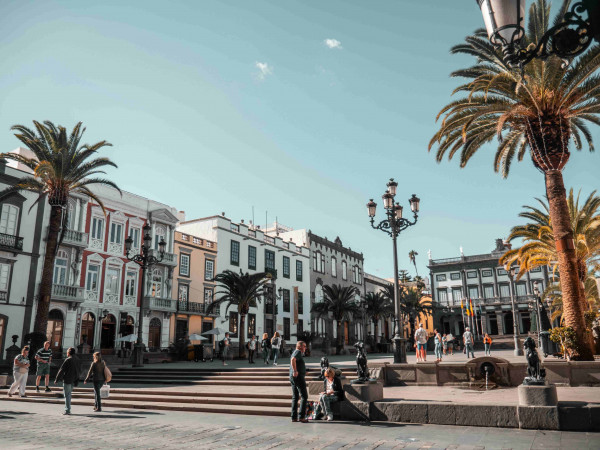country page SPAin
Are you planning a move from Germany to Spain?
UTS supports you with your move and ensures that everything runs smoothly. Our experts plan and calculate all the details of your move to Spain carefully and conscientiously and advise you personally on all relevant issues.
Spain is a fascinating country with a rich history and culture. It has an area of 505,000 km2, making it the fourth largest country in Europe. The population of Spain is about 47 million people and is very diverse as the country has a long history of immigration. The capital of Spain is Madrid and other major cities are Barcelona, Valencia and Seville.
Spain is known for its beautiful landscape of beaches, mountains and rivers. Some of the country's most famous sights are the Alhambra in Granada, the Sagrada Familia in Barcelona and Park Güell in Barcelona. Spanish cuisine is also very popular and known for its variety, including tapas, paella and fresh fish and seafood dishes. Overall, Spain offers a wealth of history, culture, landscape and leisure opportunities that make it an attractive destination for emigrants.
On this page you will find a lot of important information about moving to Spain. UTS gives you helpful tips and advice on entry and import regulations, moving with animals, rental prices and more.
Your contact person

ALL TOPICS AT A GLANCE:
Our services
- Individual requirements
- Individual offers
- Pre-inspection
- Delivery & unpacking on site
- Dismantling, packing & loading
- Transport by truck
- Customs clearance
- Storage
- Transport insurance
Moving to Spain - Scheduling
Transfer times to Spain
- Madrid: 3-4 days
- Barcelona: 2-3 days
- Sevilla: 4-5 days
- Malaga: 4-5 days
- Valencia: 2-3 days

Moving to Spain
Entry requirements
As an EU citizen, you can emigrate to Spain without needing a visa. Here are some general requirements for EU citizens:
-
Passport or identity card: EU citizens need a valid passport or identity card to enter Spain.
-
Health declaration: It may be necessary to complete a health declaration in order to enter Spain.
While residing in Spain, EU citizens must maintain their legal residence status by regularly pursuing employment or a source of income, or by demonstrating sufficient means of subsistence.
Application for the "NIE" number
"NIE" stands for "Número de identificación de extranjeros" (Foreigner Identification Number). All foreigners who have any form of contact with the authorities in Spain are assigned this number. The "NIE" number is used for identification purposes and must always be indicated on the forms.
When do you need a "NIE" number?
-
For tax matters
-
When buying real estate
-
For economic activity (work, study, etc.)
The following documents are required to apply for the "NIE" number:
-
Completed application form (EX-15): Here you have to fill in your personal data and information about the trip
-
Passport or identity card
-
Two passport photos
-
Proof of financial means
-
Proof of purpose of stay
Where can the "NIE" number be applied for?
-
Personal application at a local police station in Spain
-
Personal application through a Spanish consulate abroad
Moving to SPAIN - Import regulations
Import regulations on entry
Let us advise you
Import regulations in Spain are similar to those in other European countries. Here are the most important regulations:
-
Duty-free import: EU citizens can import a certain amount of goods duty-free, including cigarettes, alcohol and perfume.
-
Cash imports of €10,000 or more must be declared.
-
Prohibited goods: Some goods are prohibited in Spain, including illegal drugs, counterfeit goods and dangerous items such as weapons and ammunition.
-
Food: There are restrictions on importing food, especially fresh produce that comes from other countries.
-
Animal and plant products: Importation of animal and plant products is restricted and may require special permits and health certificates.
-
Gifts: It is permitted to import gifts and souvenirs up to a certain value without incurring customs duties.
It is important to note that these regulations are subject to change and it is always advisable to check the current import regulations before entering Spain. Further information can be found here: IAM Country Guide

Moving with pets
Dog, cat & co. in Spain
Do you have one or more pets and naturally don't want to move without your animal friend? UTS will take care of your pet and ensure that it arrives safely in your new home.
When moving with animals, many aspects need to be considered: What preparations have to be made for the move? How does the journey by plane work out? UTS will give you the answers to these and other questions. We have summarised the most important information on this topic for you on our page Moving with animals.
EU rules make it very easy to move with your pet. However, the following rules must be observed:
-
Electronic microchip or a clearly legible tattoo made before 3 July 2011
-
Vaccination against rabies
-
EU pet passport
For more information, visit the European Union's official website "Your Europe“ EU rules on travelling with pets and other animals in the EU.
Removal with car
What should I bear in mind if I want to take my own car with me to Spain?
If you are planning to enter Spain and bring your motor vehicle with you, in addition to providing the "NIE" number, there are some steps you need to take to ensure that your vehicle complies with Spanish laws and regulations. Here are the most important steps:
Certificado de características: An expert (Perito) prepares the homologation of the technical data of your vehicle on the basis of the vehicle registration certificate.
Ficha Técnica Española: This is the technical registration certificate which you can obtain from the Spanish TÜV. You will need the following information
-
Vehicle registration
-
Certificado de características
-
NIE
-
Certificate of registration in Spain (certificado de empadronamiento)
-
Certificate of conformity
You must then pay the registration tax on imported vehicles (Impuesto de Matriculación) at the tax office and the vehicle tax (Impuesto Municipal) at the relevant town hall.
Tip for you: Before transferring your vehicle to Spain, deregister your vehicle in Germany and have it re-registered with an export licence plate. This has the advantage that you no longer have to deregister your vehicle in Spain.
Moving to Spain - Formalities
The Spanish health system
The health system in Spain is a public and free system for residents, with costs financed through taxes. It provides a wide range of medical services, including regular medical check-ups, emergency services, hospitalisation and surgical procedures.
For EU citizens, there is a right to treatment based on the European Health Insurance Card (EHIC). For non-EU citizens, private health insurance may be required.
There are a large number of public hospitals and clinics as well as a number of private hospitals and clinics that are also paid for by public health insurance.
The Spanish health system is known for its high standards and efficient organisation. In addition, residents benefit from the high quality of care.
Moving to Spain - FAQ
Frequently asked questions
Below we have summarized some of the most frequently asked questions about formalities when moving to Spain. Your UTS relocation manager will be happy to provide you with further information at any time.
Moving to Spain
Economic system
Spain is one of the 15 largest economies in the world. The economy in Spain is a modern, open economy with a strong focus on services and tourism. Important and large Spanish companies include "Banco Santander", "Telefonica" and "Grupo ACS".
The most important economic sectors in Spain are:
- Tourism: Spain is one of the most popular holiday destinations in the world and tourism is thus an important economic factor
- Services: Including finance, trade, healthcare and public administration
- Agriculture: Spain is one of the largest European suppliers of agricultural products such as vegetables, fruit and olives
- Manufacturing: Spain is known for its automotive and shipbuilding industries
- Energy: Spain is one of the largest producers of renewable energy in Europe, especially solar energy.
The average salary in Spain is 1,751 euros gross per month.
In recent years, Spain has implemented important reforms in areas such as the labour market, taxation and the banking system, which have led to an improvement in its economy. Nevertheless, the highest unemployment rate in the EU (13.1%) remains a challenge for the country's economy.

Moving to Spain - Labor market
Labor market
Work regulations in Spain are regulated by national laws and collective agreements. Here are some important regulations:
-
Legal employment: There must be a legal employment contract with an employer in Spain before you can work in Spain.
-
National insurance number: Every worker must apply for a national insurance number in order to work and contribute to social security in Spain.
-
Tax liability: Employees must pay their income tax in Spain if they work there.
-
Working time: The standard working time is 40 hours per week and special rules apply for overtime and overtime pay.
-
Holiday: Employees are entitled to at least 22 days of holiday per year.
-
Wage: The minimum wage in Spain was raised to 1,050 euros per month in 2021.
-
Social security: Employees and employers are obliged to pay social security contributions covering, among other things, sickness, disability and retirement benefits.
-
Employment contracts: Employment contracts must be in writing and contain specific terms and conditions, including duration, wages and working hours.
-
Labour rights: Workers in Spain have a right to fair treatment, including protection against discrimination and dismissal for political or trade union reasons.
Moving to Spain - house hunting
Living in Spain
Spain is an attractive country for people looking for a change in their lives. The Spanish way of life, with its warm temperatures, good food, beaches and nightlife, attracts many people.
Whether you want to live in a big city like Madrid or Barcelona, or in a smaller city like Valencia or Seville, Spain offers a wide range of housing options.
There is a wide choice of properties, including modern flats, traditional houses and luxury villas. The cost of housing can vary depending on location and size, but compared to other European countries, Spain is still very affordable.
With good transport links and a well-developed healthcare system, Spain also offers an excellent infrastructure.
Moving to Spain - Cost of living
Average rental prices in Spanish cities:
Madrid:
- 1-room flat in the city centre: ca. 1.240€
- 1-room flat outside the city centre: ca. 900€
- 3-room flat in the city centre: ca. 2.150€
- 3-room flat outside the city centre: ca. 1.550€
Barcelona:
- 1-room flat in the city centre: ca. 1.240€
- 1-room flat outside the city centre: ca. 940€
- 3-room flat in the city centre: ca. 2.100€
- 3-room flat outside the city centre: ca. 1.560€
Sevilla:
- 1-room flat in the city centre: ca. 830€
- 1-room flat outside the city centre: ca. 560€
- 3-room flat in the city centre: ca. 1.360€
- 3-room flat outside the city centre: ca. 810€
Malaga:
- 1-room flat in the city centre: ca. 960€
- 1-room flat outside the city centre: ca. 780€
- 3-room flat in the city centre: ca. 1.700€
- 3-room flat outside the city centre: ca. 1.230€
Valencia:
- 1-room flat in the city centre: ca. 970€
- 1-room flat outside the city centre: ca. 730€
- 3-room flat in the city centre: ca. 1.600€
- 3-room flat outside the city centre: ca. 1.070€

Food Prices
Average prices
Moving to Spain – Things to know
Culture and language
Spanish culture is a fascinating mosaic of history, art, music, food and lifestyle. Spain has a long history of impressive art treasures, stunning architecture and vibrant traditions. Spaniards appreciate good food and festive life, and this can be seen in the variety of their regional dishes and festivals. A trip to Spain is an experience for all the senses and offers a deep insight into the country's rich culture. It is a country where you can experience history up close, admire the art and architecture and enjoy life to the full.
The people are friendly and hospitable, which creates a relaxed and open atmosphere.
Spain's art and architecture are world-renowned and influenced by the Renaissance, Baroque and Surrealism. The Alhambra, the Cathedral of Santiago de Compostela and many other masterpieces bear witness to the country's rich history and culture. Art can be admired in museums such as the Prado Museum and the Reina Sofia Museum, which house a variety of works by famous artists.
Spanish cuisine:
Another important part of Spanish culture is Spanish cuisine. It includes typical dishes such as paella, gazpacho and churros. The use of fresh ingredients and spices is characteristic of Spanish cuisine. The tapas tradition, where small dishes are eaten as a starter or as part of a meal, is also an integral part of the culture.
Language:
The Spanish language has a long history dating back to Roman times. It is one of the most spoken languages in the world and is the official language in Spain as well as in some other countries in Latin America. It is also one of the most studied languages in the world.
Spanish traditions:
Spanish culture is also known for its festivals and traditions that are celebrated throughout the year. The Running of the Bulls in Pamplona, Semana Santa in Andalusia and La Tomatina Festival in Buñol are just some of the most famous events.
Spain also has a rich folklore and musical tradition performed with regional instruments such as the cajón, castanets and flamenco guitar. Flamenco, a form of dance and music native to Andalusia, has a long history and is an important part of Spanish culture.
Look forward to your move to Spain and become part of the Spanish culture.
